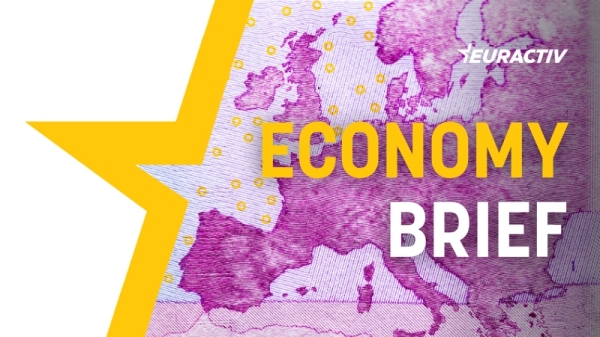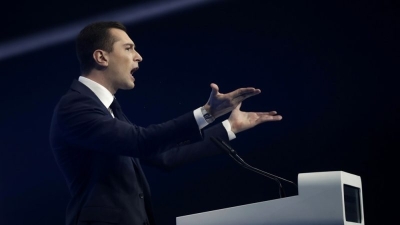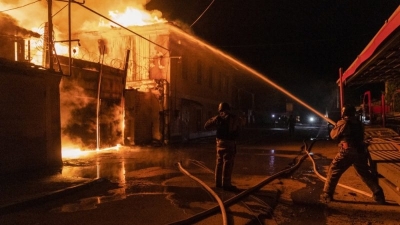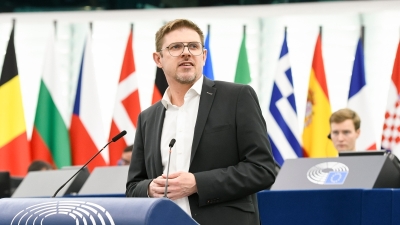Vamos a la fábrica: Reindustrialising away from Germany?

The spectre of deindustrialisation keeps European business managers and policymakers pondering and theorising.
At an event hosted by the European Policy Centre (EPC) in Brussels on Wednesday (24 April), France’s Industry Minister Roland Lescure warned that Europe could undergo complete deindustrialisation over the next few years — unless it implements government subsidies similar to those already in place in China and the US.
“If we don’t enact measures as the Chinese and [US counterparts] have done, yes, European industry, it can disappear,” Lescure said, in response to a question from Euractiv.
Lescure also stressed that, unless Europe quickly addresses its industrial decline, far-right and anti-European sentiments will only become more pervasive across the continent.
“The alternative is nationalism, it’s protectionism, it’s war,” he cautioned.
For decades, Europe’s industrial heartland has been based in Germany.
An educational system based on strongly work-focused vocational training, first-rate infrastructure and, until recently, a bountiful supply of cheap Russian energy have made Europe’s largest economy a world leader in the production of cars, chemicals, and other manufactured goods.
In particular, many believe that Europe’s industrial base — which has experienced a steep drop in production and shed hundreds of thousands of jobs over the past few years — should relocate permanently to the continent’s south.
If this happens, Spain, with its sparsely populated territory and climate perfect for the deployment of solar and wind farms, stands to be the main beneficiary.
“I sincerely believe, because I am witnessing it first-hand, that Spain can contribute to this process of re-industrialisation in Europe,” Spain’s Industry Minister Jordi Hereu told the EPC event.
There is much evidence to support Hereu’s thesis.
According to the latest data by Eurostat, the EU’s official statistics office, industrial output in Germany fell 6.1% from February 2023 to February 2024.
Spanish industrial production, by contrast, grew by 3.5% over the same period, the largest increase across the entire bloc.
The two countries’ contrasting industrial fortunes are symptomatic of their broader economic performances.
According to projections published last week by the International Monetary Fund (IMF), Spain’s economy — the fourth largest in the EU — is expected to grow nearly ten times as much as Germany’s this year (1.9% to 0.2%).
The countries’ distinct economic prospects are also reflected in their leaders’ statements.
Hereu noted on Wednesday that Spain is now “positioning itself among the industrialised countries of the world”. Meanwhile, German Economy Minister Robert Habeck recently described his country’s economic situation as “dramatically bad“.
However, Simone Tagliapietra, a senior fellow at EU policy think tank Bruegel, told Euractiv that one should distinguish between the impact of the immediate energy shock of Russia’s invasion of Ukraine in February 2022 and the broader, longer-term forces reshaping Europe’s economic and energy systems.
“The situation over the last few years is not indicative of the other question – [i.e.] the new geography of the energy industry,” he said.
Tagliapietra confirmed that Europe’s industry will indeed experience significant upheaval over the coming years: “The key fact is that the energy transition will reshape the industrial map of Europe and the world.”
The senior researcher stressed there are three different ways for Europe’s manufacturing and energy sectors to be restructured as policymakers attempt to green the continent’s economy.
The first scenario is that Spain becomes one of Europe’s main producers of renewable energy but ships much of what it makes to the EU’s traditional industrial heartland in the north.
A second scenario would see Europe’s manufacturing base permanently relocated from Germany to Spain — and more broadly, from north to south.
And a third is that Europe’s industry moves further south still — to African countries.
“It might well be the case that given the higher energy prices in Europe, the production of energy-intensive goods like ammonium, for example, or fertilisers, might make sense in African countries where you have greater amounts of renewable energy potential, rather than in Europe,” Tagliapietra explained.
Chart of the Week
Spain’s GDP growth has historically followed similar trajectories to the German one – only dropping below the latter between 2010 and 2014, as the Southern European country took a harder hit from the financial crisis, and again tumbling to -11.2% at the peak of the Covid-induced economic slump, as our Chart of the Week shows. However, the Spanish GDP is now forecast to steadily surpass its German counterpart over the next few years.
Arguably, the IMF’s projection can be seen as equally indicative of Germany’s continued economic weakness as it is of the broader shift in economic power relations across Europe.
“We may see the world becoming more multipolar,” European Central Bank president Christine Lagarde said in April last year. This seems to be especially true for Europe.
Economic Policy Roundup
Reducing reporting requirements would slash workers’ protection, Esther Lynch, head of the European Trade Union Confederation (ETUC), warned in an interview with Euractiv. Different parts of the business community and national governments have increased calls for a leaner regulatory framework – pitching scaling back reporting requirements as a crucial way to bolster the bloc’s competitiveness, and thus a key demand for the upcoming legislative mandate. However, Lynch said that this discussion was “a distraction and not a solution.“ “Businesses, especially energy-intensive businesses, are experiencing difficulties and challenges, but they are not solved by a deregulation agenda,” she said. Fearing what businesses see as an “unnecessary burden” could mean getting rid of contractual safeguards for workers and employees, Lynch said: “What we keep asking for is for that threat to be taken off the table.”
The European Parliament adopted the reform of the EU’s rules for national debt and deficits on Tuesday (23 April), despite fears from left-wing MEPs that it will lead to a new wave of austerity and prevent green investments. 367 MEPs voted in favour of the so-called “preventive arm” provisions of the new fiscal framework – known as the Stability and Growth Pact – with 161 voting against and 69 abstaining. Centre-left S&D MEP Margarida Marques said that to enable the necessary public investments in EU priorities such as the green and digital transition, new joint debt at the EU level should be implemented. Echoing recent calls by Gentiloni, Marques said: “We need to move forward towards the creation of an instrument for permanent investment at the EU level.” “This will be a vital instrument for the good implementation of this new framework for economic governance.”
Despite a series of “historic crises”, the EU economy is “stronger than five years ago”, European Commission President Ursula von der Leyen told EU lawmakers on Tuesday (23 April), touting her successes as she seeks another five-year mandate. In her last address to the current European Parliament before EU elections in June, von der Leyen also presented her agenda for the next five years. “We have gone through hell and high water. But in many respects, we have come out stronger than five years ago,” she said. Von der Leyen also highlighted the need to move forward with boosting the bloc’s private investments, arguing that the capital markets union (CMU) could raise €470 billion per year if strengthened. The figure amounts to three-quarters of what the Commission previously calculated would be needed yearly to finance the combined green and digital transition (€620bn) – and to the entire funding needed for ecological transition alone based on 2020 calculations.
The European Commission is looking to simplify member states’ auditing and control procedures for the Recovery and Resilience Facility (RRF) payments despite recent allegations of fraud, top Commission officials say. Speaking to MEPs on Monday (22 April), Economy Commissioner Paolo Gentiloni and Trade Commissioner Valdis Dombrovskis stressed that alleviating member states’ “administrative burden” need not weaken the billion RRF’s “robust” anti-graft protections. Dombrovskis also emphasised that the European Public Prosecutor’s Office’s (EPPO) ongoing investigations into hundreds of suspected cases of RRF-related embezzlement might not necessarily yield any convictions.”
The European Commission announces an investigation into Chinese discrimination against European companies in the public procurement market for medical devices. The investigation will be conducted under the auspices of the International Procurement Instrument (IPI) – the first time that the tool, which entered into force in 2022 after being proposed by the EU’s executive body in 2012, has ever been used. “Evidence gathered by the Commission indicates that China’s procurement market for medical devices has gradually become more closed for European and foreign firms, as well as for products made in the EU,” the Commission said in a statement on Wednesday (24 April).
The EU’s Net-Zero Industry Act (NZIA) will have little impact on Europe’s target to produce more technologies needed for the energy transition, experts told Euractiv, arguing that a new large-scale initiative was necessary after the EU elections. The measure – adopted by the European Parliament on Thursday (25 April) with 361 votes in favour, 121 against and 45 abstentions – enshrines the target of producing 40% of domestic needs for so-called ‘net-zero’ technologies in Europe. However, Simone Tagliapietra, a senior fellow at think-tank Bruegel, told Euractiv the EU lacks the instruments to ensure that these targets can be met, calling the NZIA objectives “paper tigers”.
The European Parliament overwhelmingly approved a watered-down version of the EU’s long-awaited platform work directive at a plenary on Wednesday (24 April), with 554 votes in favour and 56 against. The directive is the bloc’s first attempt at regulating the growing gig work economy and seeks to ensure that workers benefit from the contractual status that best fits their relationship with digital platforms like Uber, Bolt or Deliveroo. The file enshrines a complete prohibition on the processing of certain sets of data and ensures that significant algorithmic decisions – on dismissal, allocation of work, and remuneration – are overseen by a human being. Its adoption shows that “the EU isn’t just a major regulator, but can actually protect people’s lives,” directive rapporteur Elisabetta Gualmini said in plenary.
Europe and the United States should build a “transatlantic single market” to combat the “aggressive attitude” of much of the rest of the world, says former Italian prime minister Enrico Letta. Rising tensions with China, Russia’s ongoing war in Ukraine, and the rise of the BRICS group of countries as an independent political force make it “impossible” to avoid strengthening economic ties between the EU and Washington, Letta, author of a strategic report on the EU’s single market, told an audience in Washington, DC, on Tuesday (23 April).
In the debate about a programme that could succeed the EU’s Recovery and Resilience Facility (RRF), a think tank close to the centre-right EPP has criticised “significant flaws” in the current scheme, including the lack of a plan for repaying the joint EU debt. “NextGenerationEU has two significant design flaws,” Klaus Welle from the Wilfried Martens Centre for European Studies told Euractiv. “The first one is that the search and finding of new EU own resources has not worked yet.” Welle also said the RRF lacks parliamentary oversight of how the money is spent. However, in a publication from the same think tank, Alain Lamassoure, a former French minister for budget and EPP MEP, highlighted a problematic contrast he sees between the bloc’s big policy ambitions and its limited joint budget – comparing the EU to “a giant sequoia with bonsai roots”.
Literature corner
The tricky judgements on when to loosen
Lessons for investors from the history of war finance
Read more with Euractiv




